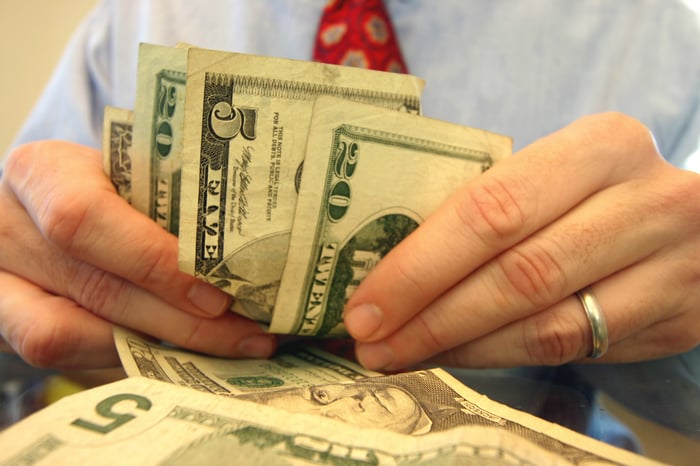Depending on your major U.S. stock index of preference, the past two to four months have been rough. The iconic Dow Jones Industrial Average and broad-based S&P 500 both ended last week in correction territory -- down 10.5% and 12.4% from their respective all-time closing highs. Things are even worse for the technology-driven Nasdaq Composite, which is off 20%. This puts the Nasdaq in a bear market.
While heightened volatility in the short term can, at times, be nerve-racking, history has shown time and again that putting your money to work during crashes and corrections is a smart move. That's because every notable move lower in the market throughout history has eventually been erased by a bull market rally.
Arguably the best thing about putting your money to work on Wall Street is that any amount of cash can be the right amount. Since most online brokerages have done away with commission fees and minimum-deposit requirements, any investment -- even $75 -- is ideal to take advantage of a stock market decline.

Image source: Getty Images.
If you have $75 ready to invest that won't be needed to cover an emergency or pay bills, the following trio of stocks would make for no-brainer buys during this market sell-off.
Novavax
The first company to check all the appropriate boxes as a no-brainer buy is biotech stock Novavax (NVAX -4.82%).
Although Novavax has a number of vaccines designed to combat airborne viruses in the works, it's the company's coronavirus disease 2019 (COVID-19) vaccine, NVX-CoV2373, which is rightly garnering all the attention. Novavax has run three large-scale studies to date, all of which delivered excellent vaccine efficacy (VE).
Last year, the company announced respective VEs from large-scale studies in the U.K. and U.S./Mexico of 89.7% and 90.4%. More recently, a large study in teens aged 12 to 17 showed an 82% VE.
The delta variant was the most common during the latter study, while the former two studies in adults targeted the original strain of COVID-19. The point is that only a small number of drug developers have hit the 90% VE mark. This should allow NVX-CoV2373 to quickly ascend the ladder to become one of the most popular inoculation options.
Another factor working in Novavax's favor is the mutability of the SARS-CoV-2 virus that causes COVID-19. While mutations are bad news for the world, they're a positive for a company with a drug-development platform that has demonstrated an ability to target vaccines and protect those who are inoculated. It effectively turns a one-time vaccine campaign into a recurring revenue stream via initial shots and boosters.
Investors are also getting quite the discount, given that Novavax delayed filing for emergency-use authorization approval in numerous key markets last year and has been slow to ramp up manufacturing of its vaccine. The former issue of filing delays is now in the rearview mirror. Further, with the company expected to bring in $4 billion to $5 billion in annual sales in 2022, it's pretty evident its manufacturing concerns are about to be in the rearview mirror, as well.
Even taking into account the most bearish Wall Street analysts' view on Novavax for 2022, the company can be purchased for less than six times forecast earnings. That's a steal of a deal.

Image source: Getty Images.
Jushi Holdings
Another no-brainer stock to buy with $75 is small-cap cannabis company Jushi Holdings (JUSHF -6.93%).
For such a fast-growing industry, you might be scratching your head and wondering why marijuana stocks have been on a 13-month downtrend. The answer lies with the dashed expectations that a Democrat-led Congress would pass cannabis reforms.
However, it's important to note that federal reforms aren't necessary for companies like Jushi Holdings to be successful. While federal legalization would be welcome, 37 states have already legalized pot in some capacity. There's plenty of organic opportunity built in for cannabis stocks to excel without Congress passing reforms.
More specific to Jushi, there are three catalysts that encouraged me to become a shareholder.
First off, the company has a laser focus on a few limited-license markets (Pennsylvania, Illinois, Virginia, and Massachusetts). Limited-license markets cap how many retail licenses are issued in total, as well as to a single business. Essentially, capped-license states ensure that Jushi has a fair chance to build up its brands and garner a following without being steamrolled by competition with deeper pockets.
Secondly, I'm impressed with management's willingness to prudently deploy its cash to make acquisitions. Even though it's a relative small fry in the U.S. cannabis space (28 operating dispensaries), Jushi has used its healthy cash balance to acquire two dispensaries in California, the biggest weed market in the world by annual sales, and Nature's Remedy to enter the Massachusetts market.
And third, management has skin in the game. Insiders accounted for $45 million of the first $250 million in capital raised by the company, and CEO Jim Capaccio holds 19.2% of the company's outstanding voting shares. When the interests of management and shareholders align, good things tend to happen.
Look for Jushi to push to recurring profitability in 2022 and not look back.

Image source: Getty Images.
American Eagle Outfitters
The third and final no-brainer stock to buy with $75 as the market sells off is teen-focused retailer American Eagle Outfitters (AEO 1.37%).
In a 13-month stretch between the March 2020 pandemic low and April 2021, shares of American Eagle Outfitters galloped from a multidecade low to an all-time high. But since peaking, shares are down 55%. That well-needed retracement is your opportunity to buy into one of the best-run retail companies on the planet.
One reason for American Eagle's long-term success is its price point. As I've previously pointed out, Abercrombie & Fitch has a tendency to price some teens (and their parents) out of purchasing their clothing. On the end other end of the spectrum are teen-based retailers, like Aeropostale, which offer big discounts on their clothing that can cheapen their image.
American Eagle sits smack-dab in the middle. It satiates the desire of teens to own brand-name merchandise without the wallet-breaking prices found at some of their competitors.
To build on this point, no mall-based retailer, in my view, has done a better job at managing its inventory over long periods of time. When certain products aren't selling, American Eagle has been historically quick to move those products out of its stores. While the company has been hurt in the near term by higher freight costs, it's important to recognize that consumer demand hasn't dropped off.
The American Eagle Outfitters growth story is also about the company's intimate-apparel brand, Aerie. Its ascent happens to coincide perfectly with consumers shying away from Victoria's Secret. Aerie has consistently delivered double-digit same-store sales growth, with a 72% aggregate sales increase since 2019.
With Aerie growing like a weed and the company's digital sales rapidly increasing from pre-pandemic levels, American Eagle Outfitters is an absolute bargain at less than seven times Wall Street's forward-year consensus earnings.





